Module 3 Life now and then短语句子复习课件(共22张PPT)外研版九年级英语下册
文档属性
| 名称 | Module 3 Life now and then短语句子复习课件(共22张PPT)外研版九年级英语下册 |
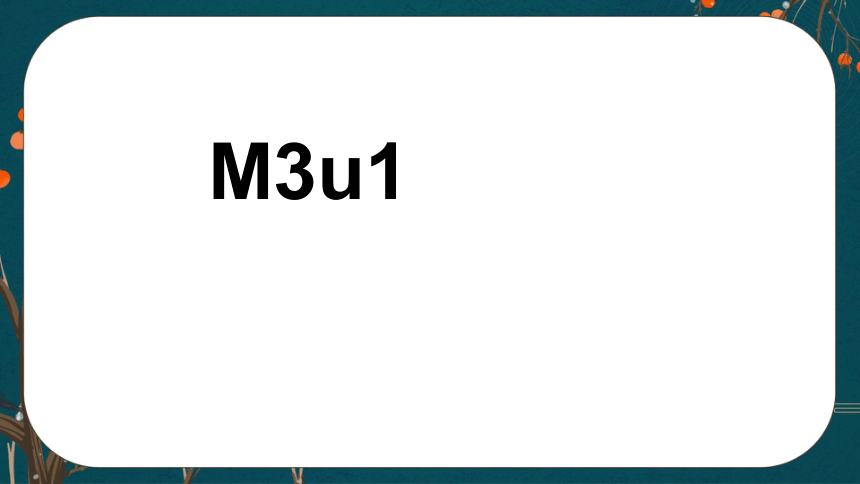
|
|
| 格式 | pptx | ||
| 文件大小 | 396.5KB | ||
| 资源类型 | 教案 | ||
| 版本资源 | 外研版 | ||
| 科目 | 英语 | ||
| 更新时间 | 2024-02-24 00:00:00 | ||
图片预览

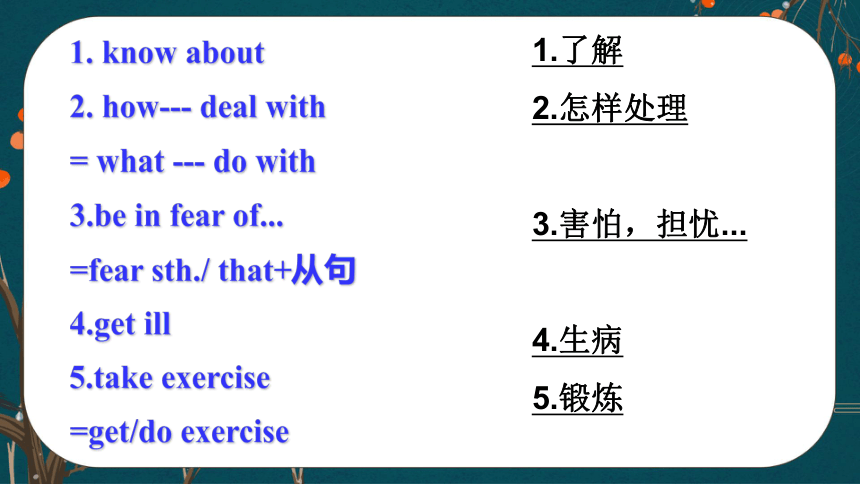
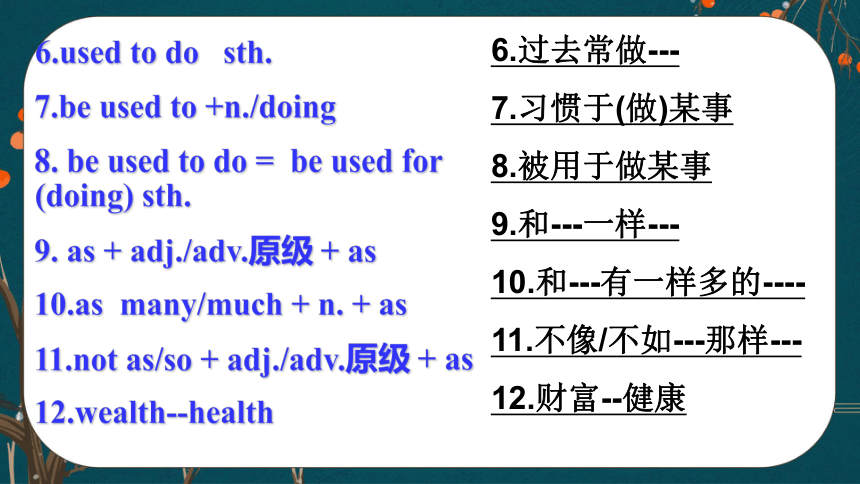
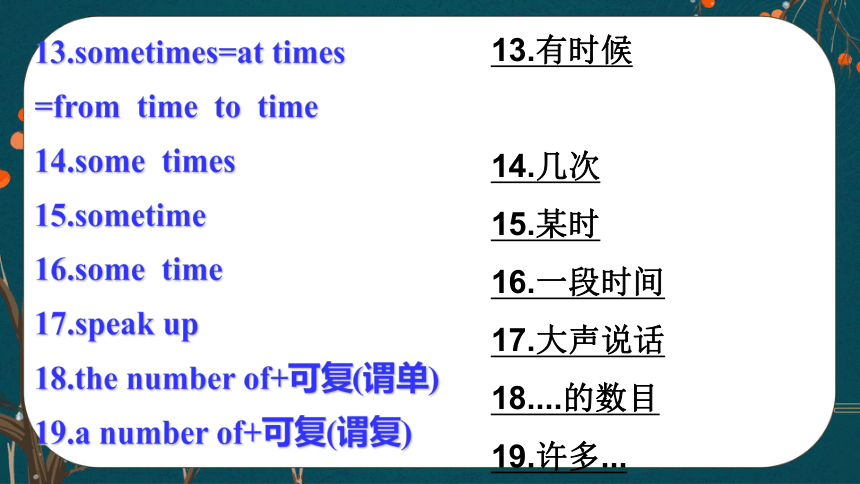
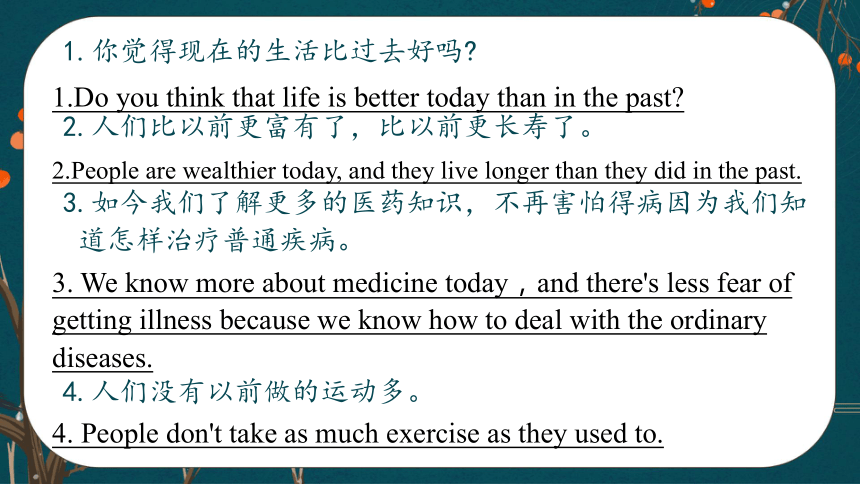
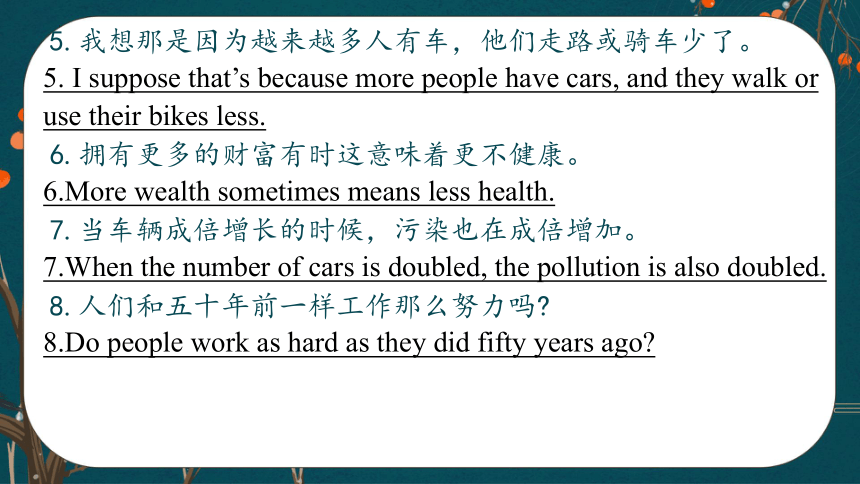
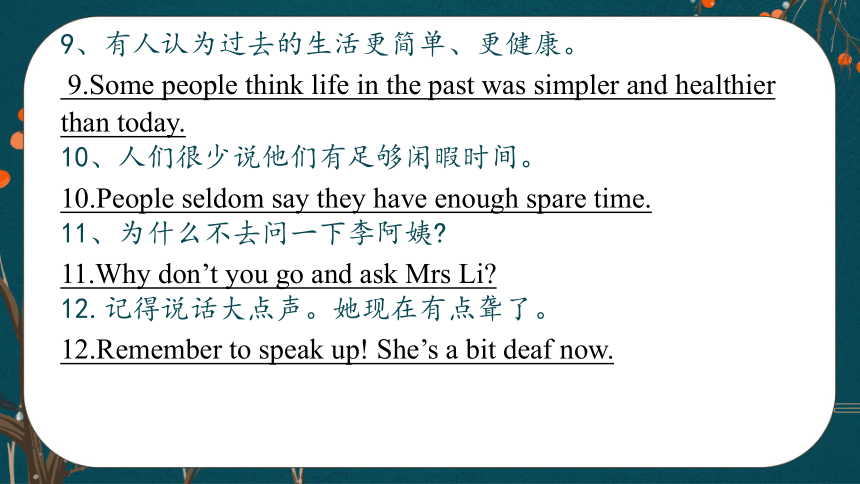
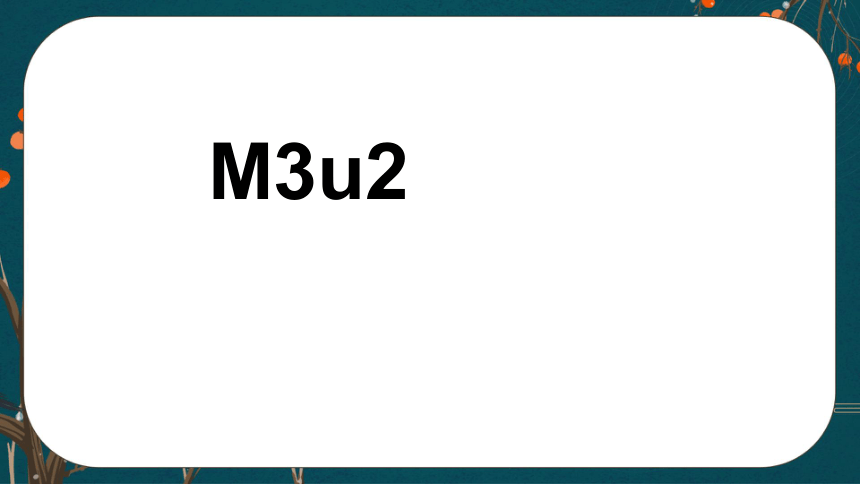
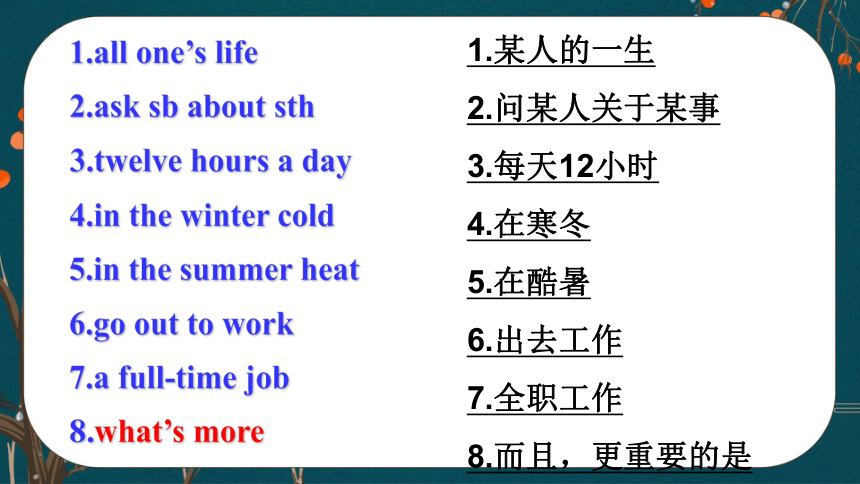
文档简介
(共22张PPT)
M3u1
1.了解
2.怎样处理
3.害怕,担忧...
4.生病
5.锻炼
1. know about
2. how--- deal with
= what --- do with
3.be in fear of...
=fear sth./ that+从句
4.get ill
5.take exercise
=get/do exercise
6.过去常做---
7.习惯于(做)某事
8.被用于做某事
9.和---一样---
10.和---有一样多的----
11.不像/不如---那样---
12.财富--健康
6.used to do sth.
7.be used to +n./doing
8. be used to do = be used for (doing) sth.
9. as + adj./adv.原级 + as
10.as many/much + n. + as
11.not as/so + adj./adv.原级 + as
12.wealth--health
13.有时候
14.几次
15.某时
16.一段时间
17.大声说话
18....的数目
19.许多...
13.sometimes=at times
=from time to time
14.some times
15.sometime
16.some time
17.speak up
18.the number of+可复(谓单)
19.a number of+可复(谓复)
1.Do you think that life is better today than in the past
2.People are wealthier today, and they live longer than they did in the past.
3. We know more about medicine today,and there's less fear of getting illness because we know how to deal with the ordinary diseases.
4. People don't take as much exercise as they used to.
1.你觉得现在的生活比过去好吗
2.人们比以前更富有了,比以前更长寿了。
3.如今我们了解更多的医药知识,不再害怕得病因为我们知道怎样治疗普通疾病。
4.人们没有以前做的运动多。
5. I suppose that’s because more people have cars, and they walk or use their bikes less.
6.More wealth sometimes means less health.
7.When the number of cars is doubled, the pollution is also doubled.
8.Do people work as hard as they did fifty years ago
5.我想那是因为越来越多人有车,他们走路或骑车少了。
6.拥有更多的财富有时这意味着更不健康。
7.当车辆成倍增长的时候,污染也在成倍增加。
8.人们和五十年前一样工作那么努力吗
9.Some people think life in the past was simpler and healthier than today.
10.People seldom say they have enough spare time.
11.Why don’t you go and ask Mrs Li
12.Remember to speak up! She’s a bit deaf now.
9、有人认为过去的生活更简单、更健康。
10、人们很少说他们有足够闲暇时间。
11、为什么不去问一下李阿姨
12.记得说话大点声。她现在有点聋了。
M3u2
1.某人的一生
2.问某人关于某事
3.每天12小时
4.在寒冬
5.在酷暑
6.出去工作
7.全职工作
8.而且,更重要的是
1.all one’s life
2.ask sb about sth
3.twelve hours a day
4.in the winter cold
5.in the summer heat
6.go out to work
7.a full-time job
8.what’s more
9.一两次
10.结婚
11.得到好的教育
12.忙于做某事
13.感到孤独
14.起…的作用;扮演…角色
15.一般而言
16.兼职工作
9.once or twice
10.get married
11.have a good education
12.be busy doing
13.feel lonely
14.play the role of…
15.generally speaking
16.a part-time job
17.过去与现在的生活
18. 电灯
19.一位善良而慈爱的母亲
20.女性的角色
21.步行;乘自行车
22.乘坐公交车、飞机
23.京剧
17.life now and then=life today and in the past
18.electric lights
19.a kind and loving mother
20.the role of women
21.on foot ;by bike
22.take the bus/a plane
23. the Beijing Opera
24.如此多的---
如此多的---
25.如此--- (以至于---)
如此--- (以至于---)
26.总而言之,一句话
简言之
总之
24.so + many + 可复n.
so + much + 不可n.
25.so + adj./adv. (+ that---)
such + (a/an) + adj. + 可单n. ( + that--- )
26.in a word
in short
in conclusion
1.She has lived in Beijing all her life.
2.What was your life like in the past
3.He often worked twelve hours a day outside in the winter cold or in the summer heat.
4.She was a kind and loving mother.
5.There were five children in my family, and looking after us was more than a full-time job.
1.她一辈子都在北京生活。
2.您过去的生活是什么样的?
3.他经常一天工作12小时,无论严寒还是酷暑。
4.她是一位善良且慈爱的母亲。
5.我家过去有5个孩子,照料我们比做一份全职工作还要辛苦。
6.I wasn’t sent to school because my family couldn’t afford it, and what’s more, because I was a girl.
7.She has a good education, and she goes to work even after getting married.
8.I’m happy to see she’s busy working every day, but sometimes I feel lonely because she can’t come to see me often.
9.Now you can take the bus everywhere.
6.我没有被送去上学,因为我家负担不起,而且因为我是女孩。
7.她接受过良好的教育,甚至结婚后还去工作。
8.看到她每天忙碌地工作我很开心,但是有时候我感到孤独,因为她不能经常来看我。
9.现在你们到哪里都可以坐公交车。
10.The only thing I don’t like, though, is that there’s so much more traffic.
11.It’s so difficult to cross the road.
12. There’re so many good programmes, like the Beijing Opera and old films.
13.Generally speaking, I think life is better today.
10.不过,只有一件事我不喜欢,那就是交通比以前更拥挤了。
11.过马路那么难。
12.有那么多好节目,比如京剧和老电影。
13.总的说来, 我认为今天的生活更好了。
M3u3
1.形容词的作用
2.副词的作用
3.well, badly,hard等
4.enough做副词
5.early, late, fast, far, close, high
1.后+n. 做定语;
系动词+adj. 做表语。
2.修饰v. 一般放在实义动词后;
修饰adj./adv, 一般放在形容词、副词前;
修饰句子,放在句子前,用逗号隔开。
3.只放在句尾
4.要放在形容词的后面
5.既是adj.也是adv.
6.adj.变adv.
7.变比较级/最高级
一般情况
以e结尾的
以“辅元辅”结尾的,双写尾字母
“辅音字母+y结尾”的
多音节形容词
6.adj.词尾加ly变成adv. ;
但是以le结尾的直接加y.
7.+er/est
加r/st
去y加ier/iest
多音节形容词
8.特殊变化
8.many/ much----more----most
little----less----least
good / well----better----best
bad/ badly/ ill ----worse----worst
far--farther 更远的--farthest最远的
further更远的,更进一步地--furthest 最远的,最大程度上地
old--older --oldest 表示年龄比较
elder-- elder--eldest表示家里排行
9.同级比较
10. A比B...
11.最...
12.越来越...
13.越...越...
14. 最...之一
9.as...as... ; not so/as...as...
10. A +be+adj.比+than+B
A+V.+adv.比+than+B
11.最高级+ in / of / among
12.比+and+比
13.The+比+主+谓,the+比+主+谓
14.one of +adj.最+n.复
比+than+any other...
15.把他当作…
16.(不可数 )许多,大量的
17.很多(放句末,修饰v.)
18.坐在马背上
19. 乘坐马拉的车
20.长途
15.think of him as…
16.a great deal of + un.
17.a great deal = a lot
18.on horseback
19.by horse-drawn carriage(draw v.画,拉,拖)
20.long distance
(distance n.距离)
21.舒适且便利
22.巨大的,庞大的
23.废料,粪便
24. 除掉,去掉,摆脱
25.习惯于---
21.in comfort and convenience
22.enormous adj.
23.manure
24.get rid of
25.be used to +n./doing
M3u1
1.了解
2.怎样处理
3.害怕,担忧...
4.生病
5.锻炼
1. know about
2. how--- deal with
= what --- do with
3.be in fear of...
=fear sth./ that+从句
4.get ill
5.take exercise
=get/do exercise
6.过去常做---
7.习惯于(做)某事
8.被用于做某事
9.和---一样---
10.和---有一样多的----
11.不像/不如---那样---
12.财富--健康
6.used to do sth.
7.be used to +n./doing
8. be used to do = be used for (doing) sth.
9. as + adj./adv.原级 + as
10.as many/much + n. + as
11.not as/so + adj./adv.原级 + as
12.wealth--health
13.有时候
14.几次
15.某时
16.一段时间
17.大声说话
18....的数目
19.许多...
13.sometimes=at times
=from time to time
14.some times
15.sometime
16.some time
17.speak up
18.the number of+可复(谓单)
19.a number of+可复(谓复)
1.Do you think that life is better today than in the past
2.People are wealthier today, and they live longer than they did in the past.
3. We know more about medicine today,and there's less fear of getting illness because we know how to deal with the ordinary diseases.
4. People don't take as much exercise as they used to.
1.你觉得现在的生活比过去好吗
2.人们比以前更富有了,比以前更长寿了。
3.如今我们了解更多的医药知识,不再害怕得病因为我们知道怎样治疗普通疾病。
4.人们没有以前做的运动多。
5. I suppose that’s because more people have cars, and they walk or use their bikes less.
6.More wealth sometimes means less health.
7.When the number of cars is doubled, the pollution is also doubled.
8.Do people work as hard as they did fifty years ago
5.我想那是因为越来越多人有车,他们走路或骑车少了。
6.拥有更多的财富有时这意味着更不健康。
7.当车辆成倍增长的时候,污染也在成倍增加。
8.人们和五十年前一样工作那么努力吗
9.Some people think life in the past was simpler and healthier than today.
10.People seldom say they have enough spare time.
11.Why don’t you go and ask Mrs Li
12.Remember to speak up! She’s a bit deaf now.
9、有人认为过去的生活更简单、更健康。
10、人们很少说他们有足够闲暇时间。
11、为什么不去问一下李阿姨
12.记得说话大点声。她现在有点聋了。
M3u2
1.某人的一生
2.问某人关于某事
3.每天12小时
4.在寒冬
5.在酷暑
6.出去工作
7.全职工作
8.而且,更重要的是
1.all one’s life
2.ask sb about sth
3.twelve hours a day
4.in the winter cold
5.in the summer heat
6.go out to work
7.a full-time job
8.what’s more
9.一两次
10.结婚
11.得到好的教育
12.忙于做某事
13.感到孤独
14.起…的作用;扮演…角色
15.一般而言
16.兼职工作
9.once or twice
10.get married
11.have a good education
12.be busy doing
13.feel lonely
14.play the role of…
15.generally speaking
16.a part-time job
17.过去与现在的生活
18. 电灯
19.一位善良而慈爱的母亲
20.女性的角色
21.步行;乘自行车
22.乘坐公交车、飞机
23.京剧
17.life now and then=life today and in the past
18.electric lights
19.a kind and loving mother
20.the role of women
21.on foot ;by bike
22.take the bus/a plane
23. the Beijing Opera
24.如此多的---
如此多的---
25.如此--- (以至于---)
如此--- (以至于---)
26.总而言之,一句话
简言之
总之
24.so + many + 可复n.
so + much + 不可n.
25.so + adj./adv. (+ that---)
such + (a/an) + adj. + 可单n. ( + that--- )
26.in a word
in short
in conclusion
1.She has lived in Beijing all her life.
2.What was your life like in the past
3.He often worked twelve hours a day outside in the winter cold or in the summer heat.
4.She was a kind and loving mother.
5.There were five children in my family, and looking after us was more than a full-time job.
1.她一辈子都在北京生活。
2.您过去的生活是什么样的?
3.他经常一天工作12小时,无论严寒还是酷暑。
4.她是一位善良且慈爱的母亲。
5.我家过去有5个孩子,照料我们比做一份全职工作还要辛苦。
6.I wasn’t sent to school because my family couldn’t afford it, and what’s more, because I was a girl.
7.She has a good education, and she goes to work even after getting married.
8.I’m happy to see she’s busy working every day, but sometimes I feel lonely because she can’t come to see me often.
9.Now you can take the bus everywhere.
6.我没有被送去上学,因为我家负担不起,而且因为我是女孩。
7.她接受过良好的教育,甚至结婚后还去工作。
8.看到她每天忙碌地工作我很开心,但是有时候我感到孤独,因为她不能经常来看我。
9.现在你们到哪里都可以坐公交车。
10.The only thing I don’t like, though, is that there’s so much more traffic.
11.It’s so difficult to cross the road.
12. There’re so many good programmes, like the Beijing Opera and old films.
13.Generally speaking, I think life is better today.
10.不过,只有一件事我不喜欢,那就是交通比以前更拥挤了。
11.过马路那么难。
12.有那么多好节目,比如京剧和老电影。
13.总的说来, 我认为今天的生活更好了。
M3u3
1.形容词的作用
2.副词的作用
3.well, badly,hard等
4.enough做副词
5.early, late, fast, far, close, high
1.后+n. 做定语;
系动词+adj. 做表语。
2.修饰v. 一般放在实义动词后;
修饰adj./adv, 一般放在形容词、副词前;
修饰句子,放在句子前,用逗号隔开。
3.只放在句尾
4.要放在形容词的后面
5.既是adj.也是adv.
6.adj.变adv.
7.变比较级/最高级
一般情况
以e结尾的
以“辅元辅”结尾的,双写尾字母
“辅音字母+y结尾”的
多音节形容词
6.adj.词尾加ly变成adv. ;
但是以le结尾的直接加y.
7.+er/est
加r/st
去y加ier/iest
多音节形容词
8.特殊变化
8.many/ much----more----most
little----less----least
good / well----better----best
bad/ badly/ ill ----worse----worst
far--farther 更远的--farthest最远的
further更远的,更进一步地--furthest 最远的,最大程度上地
old--older --oldest 表示年龄比较
elder-- elder--eldest表示家里排行
9.同级比较
10. A比B...
11.最...
12.越来越...
13.越...越...
14. 最...之一
9.as...as... ; not so/as...as...
10. A +be+adj.比+than+B
A+V.+adv.比+than+B
11.最高级+ in / of / among
12.比+and+比
13.The+比+主+谓,the+比+主+谓
14.one of +adj.最+n.复
比+than+any other...
15.把他当作…
16.(不可数 )许多,大量的
17.很多(放句末,修饰v.)
18.坐在马背上
19. 乘坐马拉的车
20.长途
15.think of him as…
16.a great deal of + un.
17.a great deal = a lot
18.on horseback
19.by horse-drawn carriage(draw v.画,拉,拖)
20.long distance
(distance n.距离)
21.舒适且便利
22.巨大的,庞大的
23.废料,粪便
24. 除掉,去掉,摆脱
25.习惯于---
21.in comfort and convenience
22.enormous adj.
23.manure
24.get rid of
25.be used to +n./doing
同课章节目录
- Module 1 Travel
- Unit 1 We toured the city by bus and by taxi
- Unit 2 It's a long story.
- Unit 3 Language in use
- Module 2 Education
- Unit 1 They don't sit in rows.
- Unit 2 What do I like best about school?
- Unit 3 Language in use
- Module 3 Life now and then
- Unit 1 They sometimes work harder.
- Unit 2 I think life is better today.
- Unit 3 Language in use.
- Module 4 Rules and suggestions
- Unit 1 You must be careful of falling stones.
- Unit 2 we must keep the camp clean.
- Unit 3 Language in use.
- Revison A
- Module 5 Look after yourself
- Unit 1 We'd better get you to hospital.
- Unit 2 Get off the sofa!
- Unit 3 Language in use.
- Module 6 Eating togethe
- Unit 1 When is the school-leavers' party?
- Unit 2 Knives and forks are used for most Western
- Unit 3 Language in use
- Module 7 English for you and me
- Unit 1 Have you ever been to an English corner?
- Unit 2 We all own English.
- Unit 3 Language in use
- Module 8 My future life
- Unit 1 Here's to our friendship and the future
- Unit 2 I know that you will be better at maths.
- Unit 3 Language in use
- Revison B
